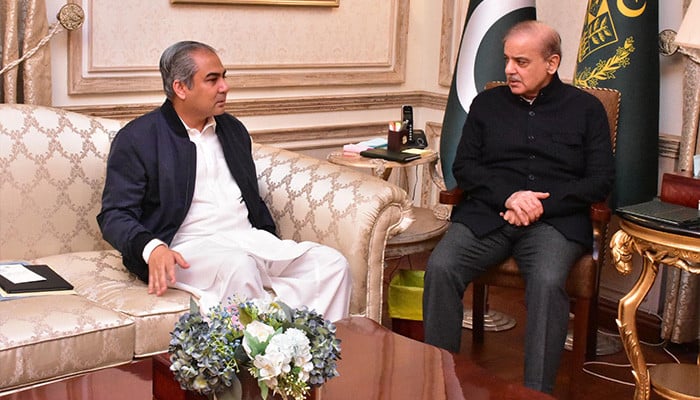Health
Provinces face new targets under fiscal pact
字号+ Author:Smart News Source:Business 2025-01-15 08:13:05 I want to comment(0)
• IMF, govt agree on need to transfer greater social, development role to provinces • Lender calls for prudent fiscal, monetary policies, mobilisation of untapped tax bases • Asks govt to reduce state intervention in economy, enhance competition ISLAMABAD: The federal government and the International Monetary Fund (IMF) have agreed on the need to transfer greater social and development responsibilities to provinces under the National Fiscal Pact (NFP), which was signed by all four provinces in September. Renewed commitments to the NFP were a key focus during the IMF’s staff-level visit from Nov 12 to 15. For the first time, discussions focused on provincial fiscal management and the implementation of reforms. During the visit, the IMF mission, led by Nathan Porter, met senior officials from the federal and provincial governments, the State Bank of Pakistan (SBP), and private sector representatives. “We agreed with the need to continue prudent fiscal and monetary policies, revenue mobilisation from untapped tax bases, while transferring greater social and development responsibilities to provinces,” Mr Porter said in a statement at the conclusion of the visit. The NFP outlines a plan for provinces to assume funding responsibilities for the Benazir Income Support Programme (BISP), higher education, and development projects currently financed through the federal Public Sector Development Programme (PSDP). A finance ministry official said that while there is no timeline for transferring these tasks to provinces, they will need to collaborate with the federal government to implement the changes. According to the IMF, discussions with Pakistani authorities centred on reducing economic vulnerabilities and laying a foundation for sustainable growth. Staff visits are standard practice for countries with semi-annual programme reviews and aim to engage with the authorities and other stakeholders on the country’s economic developments and policies and the status of planned reforms. “We are encouraged by the authorities’ reaffirmed commitment to the economic reforms supported by the 2024 Extended Fund Facility (EFF). The next mission associated with the first EFF review is expected in the first quarter of 2025,” the IMF said. Mr Porter further said that, in addition, structural energy reforms and constructive efforts are critical to restore the sector’s viability, and Pakistan should take steps to decrease state intervention in the economy and enhance competition, which will help foster the development of a dynamic private sector. “Strong programme implementation can create a more prosperous and more inclusive Pakistan, improving living standards for all Pakistanis,” he further said. For the first time, the IMF assessed provincial fiscal management and structural reforms beyond the usual focus on provincial surpluses. It also examined spending in social sectors such as education and health. Although some sources claimed that the review highlighted concerns over a reported investment of Rs200 billion ($700 million) by the Punjab government’s in a UAE-based fund, finance ministry officials neither confirmed nor denied these reports. When contacted, a top official said, “What’s the harm in investing surplus in PIBs (Pakistan Investment Bonds)?” Subsequently, Punjab Information Minister Azma Bokhari clarified that the provincial government had not made any such investment, nor was the matter discussed in the government functionaries’ meeting with the IMF team. Another senior official subsequently told Dawn the investment was in government T-bills. The lender has also advised provinces on achieving targets under the NFP, with the first formal review scheduled for March 2025. Following reports of an initial deficit of Rs160bn in the first quarter of the current fiscal year, the finance ministry had revised its figures, showing a surplus of Rs40bn for Punjab. According to Ms Bokhari, the IMF agreed that the Punjab government had a surplus of approximately Rs40 billion at the end of 1st quarter and that the province was on track to achieve its committed surplus of Rs. 630 billion at the end of the current financial year. She also clarified that the province did not have any quarterly targets under the National Fiscal Pact. Provinces are expected to raise their tax-to-GDP ratio from the current 0.8pc to 3.8pc. Key initiatives include the introduction of an agricultural income tax, the expansion of GST to cover more services, and higher property taxes. The FBR has been tasked with improving tax enforcement and increasing revenue from retail, wholesale, property and sales taxes. These actions are expected to lead to an extra 3.7 percentage point increase in the tax-to-GDP ratio.
1.This site adheres to industry standards, and any reposted articles will clearly indicate the author and source;
 Related Articles
Related Articles-
Malala Yousafzai to attend international girls’ education conference in Islamabad
2025-01-15 07:55
-
جانی ڈپ کی بیٹی لیلی روز ڈپ نے دس گنا زیادہ محنت کرنے کا عہد کیا۔
2025-01-15 06:52
-
اسکویڈ گیم کے ستارے بی ٹی ایس کے وی کے ساتھ افواہوں پر خاموشی توڑتے ہیں
2025-01-15 06:50
-
نکی گلیسر نے پیٹ ڈیوڈسن کے گستاخانہ جُوک پر خاموشی توڑ دی۔
2025-01-15 05:28
 User Reviews
User Reviews Recommended Reads
Recommended Reads Hot Information
Hot Information- Policeman robbed at gunpoint in Karachi
- نکی گلیسر نے پیٹ ڈیوڈسن کے گستاخانہ جُوک پر خاموشی توڑ دی۔
- شاہ چارلس نے جے سی بی کی ورثے کو نئے شاہی وارنٹ کے ساتھ تسلیم کیا۔
- میگن مارکل کے ناراض والد نے اپنی زندگی میں ایک تبدیلی لانے والا قدم اٹھاتے ہوئے آخری اپیل کی ہے۔
- Ramsha Khan turns head with bold BTS video from latest photoshoot
- سیلینا گومز اس ایک چیز سے بالکل نفرت کرتی ہے جو اسے پریشان کرتی ہے۔
- نکی گلیسر نے پیٹ ڈیوڈسن کے گستاخانہ جُوک پر خاموشی توڑ دی۔
- پرنسز شارلین نے اپنے خاندان کے ہمراہ خوبصورتی سے نیا سال منایا۔
- Saim Ayub’s injury puts Champions Trophy spot at risk
 Abont US
Abont US
Follow our WhatasApp account to stay updated with the latest exciting content













